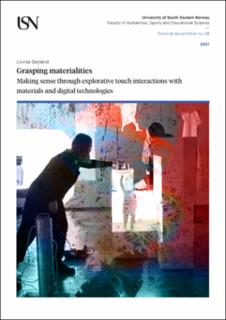Helt i oppstarten av doktorgradsprosjektet i fjor høst
sendte jeg inn et abstract til workshopen,
Material,
Spatial and Sensory Encounters with the Picturebook Object ved
Koç University i Istanbul. Workshopen
så interessant ut for mitt prosjekt der jeg undersøker embodied learning med
fokus på sense-making i interaksjon mellom fysisk og digital materialitet. Deler
av empirien i prosjektet består av interaksjon med bildebokapper. Jeg skrev og
sendte inn abstract først og fremst som en øvelse og overraskelsen var stor da
jeg ble antatt. Egentlig hadde jeg vel ikke tenkt meg til Istanbul, sånn helt i
oppstarten av doktorgradsprosjektet, men dette var en fantastisk mulighet. Heldigvis
hadde jeg et halvt års tid til forberedelser og gjennomføring av et planlagt
pilotprosjekt.
Kvelden før workshopens start ankom jeg universitetet etter
en lang reise gjennom støyende trafikkaos og regnfulle gater (Ja, regnfullt, i
Istanbul i juni). På campus var det eget gjestehus: Henry Ford Guest House, der
jeg var innlosjert. Universitetsbygningen fremsto for meg som majestetisk og
massiv denne første kvelden og skydekket hang tungt over universitetsplassen. Jeg
undret meg over hva jeg egentlig hadde begitt meg utpå. Ville mitt
bidrag være interessant for de andre workshopdeltakerne? Ville jeg klare å
formidle og diskutere prosjektet på en forståelige måte?

Neste morgen troppet jeg opp godt forberedt og med spenning
i kroppen. Dagen startet med kaffedrikking og uformelle samtaler med de andre
deltakerne. Jeg ble møtt av gjestfrihet, hyggelige, varme og interessante
fagfolk og det jeg skulle begi meg utpå framstod som relativt ufarlig. Workshopen gav en inspirerende debatt blant
internasjonale lærere, psykologer, kunstnere, bibliotekarer og illustratører
med fokus på hvordan materialitet i bildebøker fremmer barns sensoriske
erfaringer, inkludert berøring, smak og lukt. Det var flere interessante sessions som: The Question
of Materiality, Embodied Engagement, Sensory Encounters og Materials of the
Narrative. Tittelen på mitt bidrag var: A practice-led self-study of embodied making
of digital collages related to sense-making through interaction with a Picture
Book App. Jeg opplevede at det var nyttig å formidle og
få tilbakemeldinger på pilotprosjektet fra dette internasjonale miljøet på et så
tidlig tidspunkt i prosjektperioden. Jeg fikk nye spørsmål og begrep å jobbe
med, ble inspirert og motivert til å fortsette arbeidet og en trygghet og tro
på at det jeg arbeider med er av betydning.

Det ble også litt tid til å oppleve Istanbul. Sultan Ahmed-moskeen bedre kjent som Den blå
moské var et av høydepunktene. En gigantisk og vakker muslimsk moske kledd i
blå tegl. Bygd av den osmanske
sultanen Ahmed I en gang mellom 1609 og 1616. Størrelsen og omfanget var virkelig imponerende. Den opprinnelige arkitektens visjon var å bygge en storslått helligdom med fremtredende islamske trekk.
Nattmarkedet i byen var også et høydepunkt. I godt over 500
år har handelsmenn og forbrukere prutet i dette hjørnet av Istanbul.
Tepper, ryer, lanterner, smykker, keramikk,
klær, tekstiler, lær, krydder og mye mer var i omsetning i et mylder av lukter,
lyder og folk. Mildt sagt, fascinerende! Siste kvelden ble avsluttet på en av
Istanbuls mange restauranter med noen av mine nye internasjonale kollegaer.
Faglige diskusjoner avbrutt av usaklige digresjoner og latterkuler gjorde denne
kvelden unik. Tusen takk til NAFOL for støtte til å reise ut i verden! Jeg har
stiftet nye verdifulle bekjentskap, fått eventyrlige opplevelser og nytt mot til
å drive doktorgradsprosjektet videre. Jeg vil også takke min hovedveileder som
gjorde meg oppmerksom på workshopen.
Lovise Søyland






